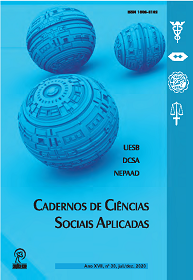Economic crisis, the pandemic and the income redistribuition policy in Brazil
DOI:
https://doi.org/10.22481/ccsa.v17i30.7124Keywords:
Emergency Aid. Income redistribution. Covid-19.Abstract
The discussion of a minimum wage which has long been present in the academia, has now drawn attention to a nationwide debate and has found its place within the general public agenda as a suitable tool against the effects of COVID-19. This article aims to analyse the evolution and importance of income redistribution policies as an instrument to social protection, highlighting the way the brazilian government deals with it in times of crises, specially in the context of the Covid-19 pandemic and the creation of Auxilio Emergencial AE (cash-transfer program called emergency aid). For the development of the article, bibliographical and documentary research (analysis of law and secondary data from IBGE, IPEA, MC, CEF, etc.) were used in order to present arguments that support the debate on social protection policies. Its pointed out that the pandemic affected Brazil during a context where the social aspects had worsen due to the strong liberal policies adopted since 2015. The GDP of 2019, in real value, is lower than the 2014; the unemployment rate until February 2020 was almost twice as recorded in 2014; and poverty has expanded. Nevertheless, in the first fifteen months of the Bolsonaro government, more than one million PBF families (social welfare program based on cash-transfer for target families) and 25,000 BPC beneficiaries (social cash-transfer program for older or those with disabilities) were excluded. The worsening situation of the economic crisis due to Covid-19 led the National Congress to approve the AE that eventually has reached more than 65 million people. Finally, we conclude that it is necessary to keep and expand the AE to the 40 million people who were not benefited until a permanent minimum wage program is approved pari passu with the structural reforms that are essential in the fight against poverty and inequality.
Downloads
References
BRASIL. Lei 10.836, de 4 de janeiro de 2004. Cria o Programa Bolsa Família e dá outras providências. Brasília, D.F. Diário Oficial da União, 12 jan.2004. Disponível em: http://www.planalto.gov.br/ccivil_03/_Ato2004-2006/2004/Lei/L10.836.htm
BRASIL. Lei 13.982, de 2 de abril de 2020. Altera a Lei nº 8.742, de 7 de dezembro de 1993, [...] e estabelece medidas excepcionais de proteção social [...] decorrente do coronavírus (Covid-19) [...], a que se refere a Lei nº 13.979, de 6 de fevereiro de 2020. Diário Oficial da União, edição extra A. Brasília, D.F., 2 abril. 2020a. Disponível em: http://www.planalto.gov.br/ccivil_03/_ato2019-2022/2020/lei/l13982.htm
BRASIL. Lei 13.998, de 14 de maio de 2020. Promove mudanças no auxílio emergencial instituído pela Lei nº 13.982, de 2 de abril de 2020; e dá outras providências. Diário Oficial da União. Brasília, D.F., 15 mai. 2020b. Disponível em: http://www.planalto.gov.br/ccivil_03/_ato2019-2022/2020/lei/L13998.htm
CASTRO, Jorge Abrahão de. Política Social e desenvolvimento no Brasil. Economia e Sociedade, Campinas, v.21, Número Especial, p.1011-1042, dez.2012.
CEF, Caixa Econômica Federal. Ações para mitigação de impacto COVID-19. 2020. Disponível em: <https://caixanoticias.caixa.gov.br/wp-content/uploads/2020/07/Auxilio_Emergencial_03_JUL_PARTE-1.pdf> Acesso em: 05/07/2020
CEPAL, Comissão Econômica da América Latina. El desafío social en tiempos del COVID-19. Santiago de Chile, Informe Especial n.3, 12 maio.2020. Disponível em: <https://www.cepal.org/es/publicaciones/45527-desafio-social-tiempos-covid-19>
COSTA, Andréa Braz da; SOARES, Marcos Antonio Tavares. Entenda porque o Auxílio Emergencial deveria ser uma política permanente no Brasil. Avoador, Vitória da Conquista, BA, 18 abril.2020. Disponível em: https://avoador.com.br/opiniao/entenda-porque-o-auxilio-emergencial-deveria-ser-uma-politica-permanente-no-brasil/
FREIRE, Débora; DOMINGUES, Edson; MAGALHÃES, Aline; SIMONATO, Tiago; MIYAGIMA, Diego. Renda Básica Emergencial: uma resposta suficiente para os impactos econômicos da pandemia da COVID-19 no Brasil? Nota Técnica. Belo Horizonte, MG: NEMEA/CEDEPLAR/UFMG, 20.mai.2020. Disponível em: <https://www.cedeplar.ufmg.br/noticias/1245-nota-tecnica-renda-basica-emergencial-uma-resposta-suficiente-para-os-impactos-economicos-da-pandemia-da-covid-19-no-brasil> Acesso em: 25/05/2020.
FRIEDMAN, Milton. Capitalismo e Liberdade. 3.ed. São Paulo: Nova Cultural, 1988. (Coleção Os Economistas).
IBGE, Instituto Brasileiro de Geografia e Estatística. Síntese de Indicadores Sociais: uma análise das condições de vida da população brasileira. Brasília, D.F.:IBGE, 2019.
IBGE, Instituto Brasileiro de Geografia e Estatística. Pesquisa Nacional por Amostra de Domicílios Contínua Trimestral – PNADC. 2020. Disponível em: <https://sidra.ibge.gov.br/tabela/4093>
IPEADATA. Brasil - Produto interno bruto (PIB): conceito de paridade do poder de compra (PPC). Frequência: Anual de 1980 até 2018. Brasília, D.F., 2020. Disponível em: <http://www.ipeadata.gov.br/Default.aspx> Acesso em: 10/07/2020.
KEYNES, John Maynard. A teoria geral do emprego, do juro e da moeda; Inflação e deflação. São Paulo: Abril Cultural, 1983.
LIMA, Juliana Domingos de. Espanha: como a pandemia acelerou um programa de renda básica. Nexo Jornal, São Paulo, 11 Jul.2020. Disponivel em: https://www.nexojornal.com.br/expresso/2020/07/11/Espanha-como-a-pandemia-acelerou-um-programa-de-renda-básica
Marx, K. Manuscritos Econômicos-Filosóficos. São Paulo: Martin Claret, 2002.
MINISTÉRIO DA CIDADANIA. RI social: relatório de programas e ações. 2020b. Disponível em: https://aplicacoes.mds.gov.br/sagi/ri/relatorios/mds/
MINISTÉRIO DA CIDADANIA. CECAD 2.O: benefícios do Programa Bolsa Família e do Benefício de Prestação Continuada. 2020a. Disponível em: <https://aplicacoes.mds.gov.br/sagi/cecad20/agregado/resumovariavelCecad.php?uf_ibge=6&nome_estado=&id=79>
ME, Ministério da Economia. Subsídios da União caem em 2018 pelo terceiro ano consecutivo. 22 abr.2020. Disponível em: <https://www.gov.br/economia/pt-br/assuntos/noticias/2019/04/subsidios-da-uniao-caem-em-2018-pelo-terceiro-ano-consecutivo>
PELLEGRINI, Josué Alfredo. Gastos (benefícios) tributários. Brasília, D.F.: Instituto Fiscal Independente, 2018. (Nota Técnica nº17). Disponível em: <https://www12.senado.leg.br/ifi/pdf/nota-tecnica-no-17-gastos-beneficios-tributarios-jun-2018/view>
REQUISITOS para solicitar el ingreso mínimo vital a través de la Seguridad Social. El Confidencial, Espanha, 23 Jun.2020. Disponível: https://www.elconfidencial.com/economia/2020-06-23/ingreso-minimo-vital-requisitos-seguridad-social_2552379/
RESENDE, Thiago. Governo tira dinheiro do Bolsa Família no Nordeste para bancar publicidade oficial. Folha de São Paulo, São Paulo, 4 Jun.2020.
https://www1.folha.uol.com.br/mercado/2020/06/governo-tira-dinheiro-do-bolsa-familia-no-nordeste-para-bancar-publicidade-oficial.shtml
SIDRA/IBGE. Sistema IBGE de Recuperação Automática. Taxa de desoupação. Disponível em: <https://sidra.ibge.gov.br/tabela/6381#resultado> Acesso em: 10/07/2020.
SUPLICY, Eduardo Matarazzo. Renda de cidadania: a saída é pela porta. São Paulo: Fundação Perseu Abramo; Cortez, 2002.
Downloads
Published
How to Cite
Issue
Section
License
Copyright (c) 2020 Cadernos de Ciências Sociais Aplicadas

This work is licensed under a Creative Commons Attribution-NonCommercial 4.0 International License.






